
Nordeuropa Forum-Zeitschrift fur Kulturstudien
Scope & Guideline
Bridging Cultures: A Forum for Scholarly Exchange
Introduction
Aims and Scopes
- Cultural Dynamics in Nordic Studies:
The journal emphasizes the exploration of cultural interactions and identities within the Nordic context, including historical perspectives and contemporary implications. - Literary Analysis and Critique:
A significant focus is placed on literary studies, examining texts from various periods and their socio-political contexts, thus enriching the understanding of Nordic literature. - Historical Contextualization:
The journal regularly integrates historical analysis to address the evolution of socio-political themes in Northern Europe, providing a comprehensive view of past and present challenges. - Interdisciplinary Approaches:
Utilizing methodologies from cultural studies, history, literature, and sociology, the journal fosters a multi-faceted understanding of Nordic and Baltic societal issues. - Environmental Studies:
There is a growing interest in environmental themes, particularly how climate change and ecological narratives are woven into Nordic literature and culture.
Trending and Emerging
- Emotional and National Identity Studies:
Recent publications indicate a heightened focus on the emotional aspects of national identities, especially in the context of the Baltic Sea region, reflecting a trend towards understanding collective memory and loss. - Governance and Welfare State Challenges:
There is an increasing examination of governance models and welfare state challenges in the Nordic region, addressing contemporary political and social issues that resonate with current global debates. - Environmental and Ecocritical Perspectives:
The rise of environmental themes, particularly in literature, is notable, showcasing how Nordic authors are engaging with ecological issues and climate change through their narratives. - Interdisciplinary Cultural Studies:
A trend towards interdisciplinary approaches that blend history, literature, and cultural studies is evident, indicating a move toward more holistic analyses of Nordic societies. - Focus on Marginalized Narratives:
Emerging themes include the exploration of marginalized voices and narratives, such as those of indigenous Sami culture and Jewish contributions in Nordic literature, highlighting a shift towards inclusivity in cultural studies.
Declining or Waning
- Traditional Historical Narratives:
There seems to be a waning interest in strictly traditional historical narratives without contemporary relevance, as researchers increasingly seek to connect historical events to current societal issues. - Purely Nationalistic Studies:
Research that focuses solely on nationalism without considering the broader implications of transnational identities and interactions is becoming less prominent. - Narrow Linguistic Studies:
The focus on narrow linguistic aspects of Nordic languages without cultural or contextual ties is decreasing, as interdisciplinary approaches gain traction. - Classical Literary Canon:
Studies centered on the classical literary canon, particularly those that do not engage with contemporary themes or issues, appear to be less frequent in recent publications.
Similar Journals

Caplletra
Advancing Open Access Scholarship in LinguisticsCaplletra is a distinguished open-access journal dedicated to the field of linguistics and language studies, published by PUBL ABADIA MONTSERRAT since its inception. Based in Barcelona, Spain, this journal has been a vital resource for researchers, professionals, and students engaged in the intricate explorations of language and its applications since its transition to open access in 2005. Despite its current quartile ranking of Q4 within the Linguistics and Language category as of 2023, Caplletra continues to serve as an inclusive platform, fostering a dialogue that encourages a diverse range of scholarly contributions. Covering an expansive scope in the converged years from 2018 to 2024, it plays a crucial role in disseminating innovative research and insights. With its ISSN 0214-8188 and E-ISSN 2386-7159, Caplletra is committed to making academic work accessible to all, enhancing the landscape of linguistic scholarship and reflecting the evolving nature of language studies.
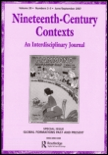
Nineteenth-Century Contexts-An Interdisciplinary Journal
Navigating the Complexities of 19th Century ThoughtNineteenth-Century Contexts: An Interdisciplinary Journal is a pivotal academic publication that serves as a vital resource for scholars and students engaged in the exploration of the complex cultural, literary, and social dimensions of the nineteenth century. Published by Routledge Journals, Taylor & Francis Ltd, this journal holds a position within the Q2 and Q3 quartiles in the fields of Literature and Literary Theory and Cultural Studies respectively, illustrating its significance and relevance in contemporary research. Since its inception in 1987, it has fostered interdisciplinary dialogue and examination of the era's rich contexts, featuring articles that weave together historical, literary, and cultural analyses. Although the journal does not currently offer an open access model, its rigorous peer-review process guarantees scholarly integrity and quality. Housed in the United Kingdom, it caters to a global audience, thereby attracting diverse perspectives and insights, making it an essential publication for anyone looking to deepen their understanding of the complexities of the nineteenth century.

Steinbeck Review
Decoding Steinbeck: A Journey Through WordsThe Steinbeck Review, published by Penn State University Press, serves as a premier platform dedicated to the exploration and critical analysis of the works and legacy of John Steinbeck. With a focus on literature and literary theory, this journal offers valuable insights for researchers, scholars, and students engaged in Steinbeck studies and American literature at large. Although not an open-access journal, its contributions are invaluable, as evidenced by its current Q3 ranking in the field, placing it within the significant discourse of contemporary literary studies. The journal aims to foster a deeper understanding of Steinbeck's impact, examining thematic, historical, and cultural contexts surrounding his work. With a commitment to quality scholarship, the Steinbeck Review continues to inspire and challenge its readership, contributing to the ongoing conversation within the literary community.

Limite-Revista de Estudios Portugueses y de la Lusofonia
Innovating Perspectives on the Lusophone ExperienceLimite-Revista de Estudios Portugueses y de la Lusofonia, published by the Universidad de Extremadura, Facultad de Filosofía y Letras, is a prominent academic journal dedicated to the study of Portuguese and Lusophone literature, culture, and linguistics. With an ISSN of 1888-4067 and an E-ISSN of 2253-7929, this journal serves as a vital platform for researchers, scholars, and students interested in the rich tapestry of Portuguese-speaking countries and their contributions to global culture. With a strong commitment to fostering interdisciplinary dialogue, Limite aims to publish innovative research that examines historical contexts, contemporary issues, and social dynamics within the Lusophone world. The journal upholds high academic standards and is indexed in various databases, enhancing its visibility and impact within the scholarly community. While currently not providing open access, Limite continues to be a key resource for anyone seeking to explore and deepen their understanding of Portuguese studies, making it an indispensable addition to academic libraries and personal collections alike.
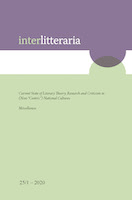
Interlitteraria
Bridging Cultures Through Critical Literary AnalysisInterlitteraria is a distinguished academic journal dedicated to the exploration and analysis of literary studies across various cultural contexts. Published by TARTU UIKOOLI KIRJASTUS OU, this Open Access journal has been making its insightful contributions to the field since 2012, ensuring widespread accessibility to its research. With an ISSN of 1406-0701 and an E-ISSN of 2228-4729, Interlitteraria aims to facilitate the exchange of knowledge among scholars, researchers, and students interested in comparative literature, literary theory, and interdisciplinary approaches to the humanities. While the journal’s HIndex and Scopus ranks are currently not specified, its dedication to academic excellence and its commitment to fostering scholarly dialogue make it an invaluable resource for those investigating contemporary literary trends and historical narratives. Based in Tartu, Estonia, this journal provides a platform for diverse literary voices and critical thought, firmly establishing itself as an essential tool for advancing the study of literature in an interconnected world.
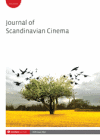
Journal of Scandinavian Cinema
Celebrating the Rich Tapestry of Scandinavian CinemaThe Journal of Scandinavian Cinema, established in 2014 and published by INTELLECT LTD, serves as a premier platform dedicated to the interdisciplinary field of film studies with a specific focus on Scandinavian cinema. With an impressive Q2 category ranking in Visual Arts and Performing Arts for 2023, and a Scopus rank placing it in the top 62nd percentile of its category, this journal is instrumental in advancing scholarly dialogue within the arts community. The journal strives to explore and critique cinematic expressions from the Nordic countries, contributing to a nuanced understanding of cultural narratives and filmic innovations. Committed to fostering accessibility and engagement, it caters to a diverse audience including researchers, professionals, and students keen to delve into the artistic, cultural, and political dimensions of cinema. The Journal of Scandinavian Cinema is essential for anyone interested in the evolution and impact of film in the Scandinavian context, promising rich insights and a robust collection of scholarly articles.
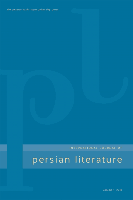
International Journal of Persian Literature
Unveiling the Theoretical Foundations of Persian LiteratureWelcome to the International Journal of Persian Literature, a premier academic publication dedicated to advancing the field of Persian literary studies. Published by PENN STATE UNIV PRESS, this journal serves as a vital platform for scholars and researchers interested in the rich tapestry of Persian literature and its theoretical underpinnings. With an ISSN of 2376-5739 and E-ISSN 2376-5755, it has established its place within the academic community, earning a category ranking of Q3 in Literature and Literary Theory, as well as a commendable Scopus rank of #481 out of 1106. Spanning the years from 2016 to 2023, the journal invites contributions that explore Persian literary texts, cultural contexts, and theoretical frameworks, fostering enriched dialogue and understanding. Although it does not currently offer Open Access, researchers and students alike are encouraged to engage with its content, which represents a significant contribution to the ongoing scholarship in the field.

MERKUR-DEUTSCHE ZEITSCHRIFT FUR EUROPAISCHES DENKEN
Navigating the Landscape of European Cultural StudiesMERKUR-DEUTSCHE ZEITSCHRIFT FUR EUROPAISCHES DENKEN is a prestigious journal published by Klett-Cotta Verlag, dedicated to the exploration of European thought, culture, and intellectual discourse. With an ISSN of 0026-0096, this journal provides a platform for critical analysis and reflection on a wide array of topics within the fields of Arts and Humanities, Cultural Studies, and Sociology. Although coverage in Scopus was discontinued in 2014, MERKUR maintains a significant historical footprint, having previously ranked #76 in Arts and Humanities and #519 in Cultural Studies. This underscores its role in contributing to scholarly conversations regarding European intellectual traditions. The journal, located at Rotebühlstraße 77, D-7004 9 Stuttgart 1, Germany, while not open access, remains an essential resource for researchers, professionals, and students alike, keen on examining the contours of European thinking and its implications in contemporary society.
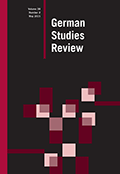
GERMAN STUDIES REVIEW
Engaging with the Rich Tapestry of German HeritageGERMAN STUDIES REVIEW, published by Johns Hopkins University Press, is a premier academic journal dedicated to the interdisciplinary study of German culture and society, merging literary, historical, and cultural studies. With a commitment to advancing scholarship since its inception in 1982, this journal serves as an essential platform for researchers, professionals, and students interested in Germanic studies, boasting an ISSN of 0149-7952 and an E-ISSN of 2164-8646. While it is presently classified in the Q4 quartile of both the Arts and Humanities (miscellaneous) and Cultural Studies categories by Scopus, its wide-ranging scope includes not just traditional literary analysis, but also contemporary cultural phenomena, making it relevant to various fields. Although the journal is not open access, its contributions are vital for fostering critical dialogue and scholarly research that explores the complexities of German culture in a global context. The GERMAN STUDIES REVIEW is an invaluable resource for anyone eager to deepen their understanding of German studies and engage with cutting-edge academic discussions.
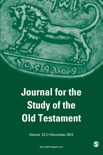
Journal for the Study of the Old Testament
Fostering Dialogue in Religious ScholarshipJournal for the Study of the Old Testament, published by SAGE PUBLICATIONS LTD, is a preeminent peer-reviewed journal dedicated to advancing the field of religious studies, particularly the scholarly investigation of the Old Testament. With its ISSN of 0309-0892 and E-ISSN 1476-6728, the journal has been a vital resource for researchers since its inception in 1976 and continues to deliver cutting-edge scholarship through 2024. Renowned for its rigorous academic standards, the journal has achieved a prestigious Q1 ranking in Religious Studies, positioning it among the top quartile of academic journals in this field. It holds a commendable 75th percentile ranking in the Scopus database, highlighting its impact and relevance in contemporary discourse. Addressed from its United Kingdom base at 1 Olivers Yard, 55 City Road, London EC1Y 1SP, the journal features a comprehensive exploration of theological themes, literary analyses, and historical contexts, aimed at researchers, professionals, and students alike. While access options may vary, the journal remains an indispensable platform for fostering scholarly dialogue and disseminating innovative ideas within the discipline.